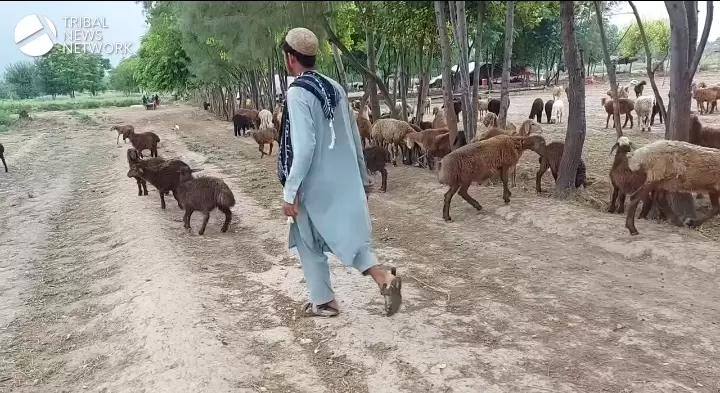
"Our ancestors also did this, and we have been living a nomadic life for generations. We have no permanent home and usually spend around six months in one place. For several years now, climate change has had a significant impact on our lives. Summers have become unbearably hot, making it difficult for us to live in tents or graze our sheep and goats outside. During winters, we move toward the Punjab regions," said 24-year-old Taweez Gul, a nomad living in the dry fields of Dara Adam Khel, Khyber Pakhtunkhwa.
Taweez Gul hails from the Paktia region of Afghanistan. For him and his family, life revolves around walking miles on foot with hundreds of sheep and goats and taking care of them.
Taweez Gul explained that there are twelve members in his family, including elders, women, and young children. They set out daily to graze their sheep and goats, but the intense heat makes it increasingly challenging. "Our elders say that it was never this hot before, but in recent years, we have seen a rise in temperatures. We were initially living in the Shamshato camp near Peshawar, but it became increasingly difficult to stay there due to the extreme heat, which is unbearable in the tents, making the children fall ill. Similarly, sometimes the rains are so heavy, or storms hit, causing further hardships; tents get damaged, and it becomes hard to care for the livestock."
Also Read: Closure of Key Road Sparks Crisis in Landi Kotal: Locals Threaten Protest Outside Cantonment
Climate change has not only affected Pakistan but also many countries around the world. Every year, the duration of the summer season is increasing while winters are getting shorter. This year, the months of June and July recorded some of the highest temperatures ever. People are being impacted by these climatic shifts, and nomads' way of life is significantly affected as well.
Regarding this issue, Dr. Muhammad Nafis, Chairman of the Environmental Science Department at Peshawar University, explained that there were three main systems of nomadic pastoralists, or Bakarwals, in the region. One system involves Pakistan and Afghanistan, the second includes Pakistan and India, and the third is within Pakistan itself. The internal system encompasses regions such as Khyber Pakhtunkhwa, Balochistan, and Sindh.
The nomadic pastoralists (Bakarwals) of Khyber Pakhtunkhwa move to the plains of Attock, Haripur, and Fatehpur during the winter months, while in the summer, they head to cooler regions such as Kaghan, Naran, Batakundi, and some tribal areas. Previously, their summer schedule involved spending four months in the highlands and four months in the plains. Additionally, they spent two months traveling to these areas and another two months returning, all on foot.
However, climate change has impacted their lives in two significant ways. Firstly, when they move to the northern areas, they face a shortage of grass as these regions often have crops like potatoes and turnips growing during that season. A few Bakarwals now carry grass with them in vehicles, but most cannot afford this. Secondly, due to climate change, there are now unpredictable temperature changes before their scheduled migration to the highlands.
During the monsoon season, intense heat causes glaciers to melt, and combined with rainfall, it leads to floods, resulting in considerable damage. They suffer from diseases, and their livestock is also adversely affected.
When asked how the hardships faced by the Bakarwals due to climate change affect the country's economy, Dr. Muhammad Nafis explained that nomads contribute significantly to the wool industry. They also provide substantial support to the meat, leather, and dairy industries. However, due to climate change, their activities have been affected, and they can no longer supply the same amount of material as they did 20 or 30 years ago.
This shortage has led to reduced supply for these industries, resulting in unemployment and increased prices. The cost of mutton and leather, for example, is likely to rise, and as leather becomes more expensive, all products made from it will also become costlier.
As grass in pastures no longer grows as it once did, fodder prices have surged due to shortages. The drying up of these pastures has forced Bakarwals, nomadic pastoralists, to buy fodder, leading to increased expenses. Consequently, this has driven up the price of livestock, affecting the economy.
Impact of Climate Change on Biodiversity
Dr. Muhammad Nafis explained to TNN that biodiversity encompasses various insects, animals, birds, and plants, each with its specific role in the ecosystem. Climate change disrupts these populations, causing certain species to migrate from affected areas, negatively impacting biodiversity. For example, the sparrow population has been declining, which Dr. Nafis attributes to climate change; the rising temperatures interfere with the hatching of sparrow eggs, leading to fewer offspring.
Disruptions in the growth and reproduction of animals, birds, and plants, whether caused by climate change or human activity, significantly affect biodiversity. Dr. Nafis emphasized that Bakarwals are also suffering due to climate change, which poses a significant threat to the economy.
He stressed the importance of raising awareness at the governmental level and among the general public about this critical issue. Nomads like Taweez Gul and others must understand the effects of climate change and take alternative measures to mitigate its impact.